
Continuous use of antiepileptic medications leads to an increased risk of Alzheimer’s disease and dementia, according to a recent study.
The study, “ Use of Antiepileptic Drugs and Dementia Risk — an Analysis of Finnish Health Register and German Health Insurance Data ,” appeared in the Journal of American Geriatrics Society.
Researchers compared the risk of dementia and antiepileptic medications both with and without known cognitive adverse effects.
Specifically, using therapies that are known to impair cognitive function correlated with a 20% greater risk of Alzheimer’s and a 60% greater risk of dementia.
The most frequently used medications with known cognitive effects include primidone, phenytoin, carbamazepine, clonazepam, and valproate.
Posts tagged as “Alzheimer’s”
![]()
"With this cooperative research program, we are proud to continue to innovate by exploring the use of Trappsol® Cyclo™ in the treatment of Alzheimer's disease."
Cholesterol has been linked to the formation of amyloid beta plaques, one of the hallmarks of Alzheimer's disease.
"I am excited for the opportunity to work with CTD on this potential new therapeutic approach in Alzheimer's disease.
The effects of cyclodextrin in Niemann-Pick Disease Type C and pre-clinical studies suggest a potential effect in Alzheimer's disease," said Dr. Kerwin.
"Alzheimer's disease affects millions and currently has no cure or disease modifying therapy.

When the brain loses these cholinergic neurons, memory loss symptoms consistent with Alzheimer's begin.
Research now shows that the abnormalities in the brain seen by patients with dementia and Alzheimer's is linked to choline-deficiency.
Human evidence shows that choline improves cognitive function in mild-to-moderate Alzheimer’s patients after treatment.
Studies prove that choline supplementation during pregnancy prevents memory loss for a lifetime.
The results of this study prove again the clinical usefulness of choline in aging patients to prevent and treat the symptoms of dementia disorders and Alzheimer’s.

Lack of sleep may be linked to risk factor for Alzheimer’s diseasePreliminary NIH study shows increased levels of beta-amyloid.
In Alzheimer’s disease, beta-amyloid proteins clump together to form amyloid plaques, a hallmark of the disease.
While acute sleep deprivation is known to elevate brain beta-amyloid levels in mice, less is known about the impact of sleep deprivation on beta-amyloid accumulation in the human brain.
In Alzheimer’s disease, beta-amyloid clumps together to form amyloid plaques, negatively impacting communication between neurons.
In Alzheimer’s disease, beta-amyloid is estimated to increase about 43 percent in affected individuals relative to healthy older adults.
A committee assembled by the National Institute on Aging and the Alzheimer’s Association published a new definition whereby Alzheimer’s disease equals the pathological accumulation of amyloid plaques and neurofibrillary tangles in the brain.
Alzheimer’s disease equals plaques and tangles in brain, not symptoms, says new NIA-AA research framework.
They will be employed in studies to understand how Alzheimer’s develops, and to test treatments targeted to the aberrant biology.
“This continues our movement toward thinking about Alzheimer’s disease as a neurobiological process rather than simply different clinical stages.
Importantly, the framework aligns Alzheimer’s disease conceptually with the rest of medicine, said lead author Clifford Jack of the Mayo Clinic in Rochester, Minnesota.

Dr. Lilian Calderón-Garcidueñas said her group studied 203 autopsies of Mexico City residents ranging in age from 11 months to 40 years.
Metropolitan Mexico City is home to 24 million people exposed daily to concentrations of fine particulate matter and ozone above U.S. Environmental Protection Agency standards.
Researchers found hallmarks of the disease among 99.5 percent of the subjects they examined in Mexico City.
Overall, the authors have documented an accelerated and early disease process for Alzheimer's in highly exposed Mexico City residents.
"Defining pediatric environmental, nutritional, metabolic and genetic risk-factor interactions are key to preventing Alzheimer's disease."

Standing for a two-hour chunk during the work day, that study found, may lead to physical discomfort all over the body, and make it harder to stay focused and energized.
So if it’s not great to sit or stand all day, what should you do at the office?
The best way to make a choice for yourself, he says, is to consult your doctor.
That said, Isaacson says the bulk of scientific evidence supports the notion that we should minimize time spent sitting.
(He does recommend wearing supportive shoes and standing on a soft mat, to reduce strain on the back and joints.)

In advanced Alzheimer's disease, huge numbers of nerve cells in the brain are dead.
But the erroneously folded forms of amyloid beta do not accumulate only in nerve cells.
Amyloid deposits are also found in the blood vessels of the brain, in the retina, and in cells known as glial cells.
"In this study we expressed the amyloid beta 1-42 in glial cells instead, and observed that huge amounts of aggregate accumulated around these cells.
"We noted that glial cells seem to produce the mature, less harmful form of amyloid beta, while neurons cannot.
The stem cell therapy of Alzheimer's disease is to administer autologous adipose tissue-derived mesenchymal stem cells intravenously.
Dr. Ra’s research team tested animals that have Alzheimer's disease and proved the effectiveness of the stem cell treatment of Alzheimer’s disease as well as the prevention of Alzheimer’s disease.
Nature CellNature Cell (KOSDAQ: 007390) is a high-tech bio enterprise, a leader of stem cell business, stem cell drugs and treatment technology development, and stem cell culture medium cosmetics.
Furthermore, Nature Cell is a member of the stem cell network Biostar, along with Rbio, GDFI Braincell Laboratory, Stem Cell Research Institute, Stemcell Life Foundation, Bethesda Hospital, R-Japan and Medicorp, which are entities committed to stem cell research for treating incurable diseases.
Biostar Stem Cell Research InstituteBiostar Stem Cell Research Institute is jointly run by Nature Cell and RBio, the adult-derived stem cells research firm.

By Beth Baker, Next Avenue ContributorThe estimated number of Americans with Alzheimer’s disease and other dementias has risen to 5.7 million, from 5.5 million in 2017, according to a report released today by the Alzheimer’s Association.
By 2025, the 2018 Alzheimer's Disease Facts and Figures report projects, 7.1 million Americans aged 65 and older will have Alzheimer’s, and by 2050, some 13.8 million.
Complicating the picture, many people have dementia from both Alzheimer’s and other causes, especially vascular.
The number of deaths from Alzheimer’s disease increased by 123% between 2000 and 2015, the report found, unlike other major causes of death, which are declining.
“Some of that increase is probably driven by physicians doing a better job of diagnosing Alzheimer’s disease and then listing it on the death certificate,” said Fargo.
